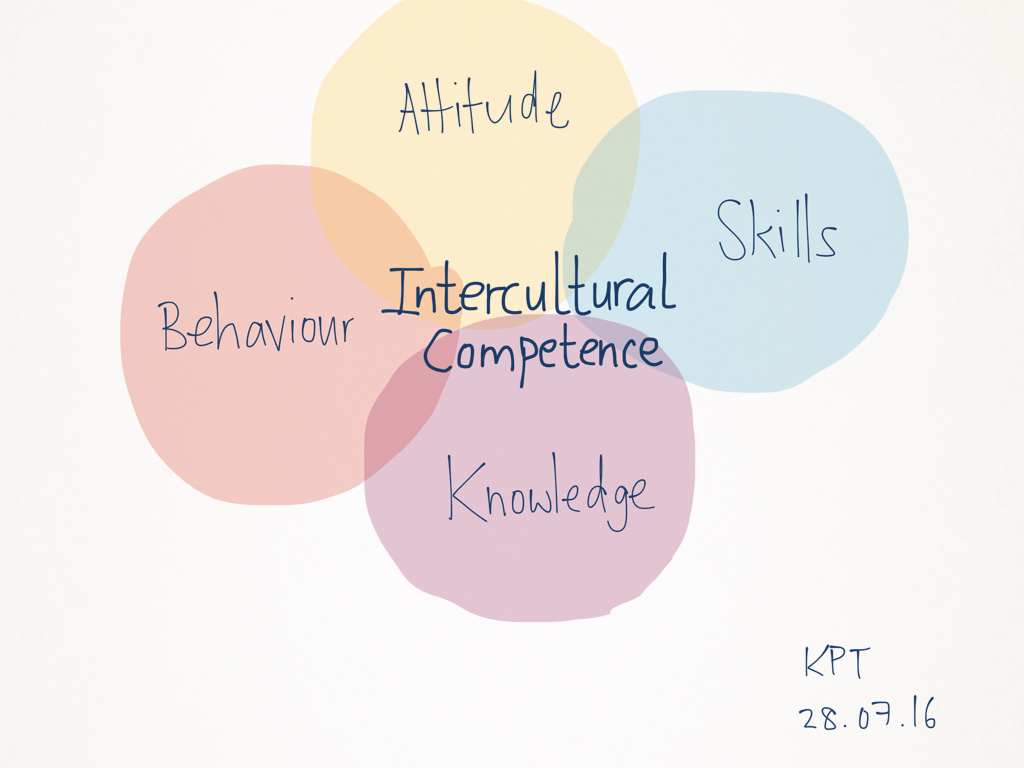
Another interesting read has been Intercultural Competence and Cultural Learning through Telecollaboration by Theresa Schenker (2012). The six-week email telecollaboration between German students learning English and American students learning German revealed that the students interest in cultural learning did not change significantly. However, the study did show that the majority of Byram’s (1997) objectives of intercultural competence were demonstrated in the email exchange.
So what is Intercultural Communicative competence?
Byram (2000) described the attributes of a person with intercultural competence communicative competence as:
…someone who is able to see relationships between different cultures—both internal and external to a society— and is able to mediate, that is interpret each in terms of the other, either for themselves or for other people. It is also someone who has a critical or analytical understanding of (parts of) their own and other cultures—someone who is conscious of their own perspective, of the way in which their thinking is culturally determined, rather than believing that their understanding and perspective is natural. (p. 9)
Thinking About…ICC
Byram’s (1997) model of ICC suggests 5 objectives that students should achieve in order to become intercultural competent communicators:
Attitudes of curiosity and openness
Knowledge of social groups and their products
Skills of interpreting and relating
Skills of discovery an interaction
Critical and cultural awareness and political education
Although my project will not be explicitly focusing on ICC, it makes sense to include activities that allow students to explore not only the target culture but also their own. This paper provides a handy list of topics to use for discussions on culture. However, I think I’ll dig deeper into ICC in future posts. And for now focus more on analysing the limitations and implications of this particular study as a starting point of designing my own.
Thinking About…the Limitations
A small sample group, participants with similar backgrounds and the short length of the study were all listed as limitations. As I think about these issues it is clear that my project may have similar issues! I will be working in partnership with The Learning Tree, which is part of bespoke Education Consultancy TSL Britain. They focus primarily on 1:1 and small group classes which means that my project is likely to have 4-6 students at best. Also, It is likely that the students will have a similar background – young Chinese learners, keen to improve their language skills so as to enter an international school or study abroad. Not a very diverse group. Finally, according to PBL Teacher Sean Ulley, The Learning Tree’s typical PBL’s last 3-4 weeks. Of course, it goes without saying that longer studies would offer more accurate results. That said, I am not disheartened! If this idea is successful then it will at that time warrant repetition and attract further opportunities for expansion.
And we must also discuss the fact that the final limitation was that the researcher was also an instructor on the course, which meant she was unable to mediate in some of the conflicts that arose during the email exchange. In this way, the fact that I, the researcher, will not be an instructor during the TC, means that there will be a neutral third party on hand to observe at distance and mediate if necessary.
Thinking About…the Implications
The author ends her study with a helpful list of things to avoid, and to do, in order to improve positive outcomes:
> “A message board or discussion forum could be added as a reflective component to allow students to discuss their experiences and to give the instructor the opportunity to mediate when tensions occur.”(P61). I am not yet sure if we will use an all-in-one TC platform such as Speak Apps to run the project or use the web-as-platform approach whereby a number of digital tools such as email, wechat, wikis, blogs etc. are accessed for more flexible, time-independent communication. Either way, it is important to avoid miscommunications by monitoring exchanges and intervening when necessary.
> Schenker (2012, p461) also quotes Belz (2002) suggestions of dealing with problems explicitly. Indeed, a comment was made on my last post that problems may be avoided if examples of conflicts are included for analysis and reflection by students.
> Finally, Schenker stresses the importance of discussing the content of the online exchanges in class. This is a chance for the instructor, not only to monitor the student interactions more easily, but also for students to extend that conversation by recycling what they have learnt, and gives them the opportunity to ask questions.
Final Thoughts
Schenker (2012) is quite upbeat at the end of her paper when she summarises TC: “As a tool that enables teachers to combine language and culture instruction, and sparks students’ interest and motivation, teachers should be open to utilising telecollaboration in their instruction and to giving students the opportunity to benefit from the direct communication with native speakers of the target culture” (p462). But how realistic is it for your average teacher to be part of, let alone design and manage an online collaborative exchange? Who has the time? Where does one get trained? Is a pay-rise included?!
Whether you call it project-based, problem-based or integrated learning it’s very value lies in its complexity, meaning most teachers laden with paperwork and constant curriculum changes just won’t be able to get stuck in. That said, if anything, there’s more likely to be demand for an organiser/designer/facilitator of such exchanges, independent from the partner school teachers themselves…hmmm…#createyourownjob…;)
Reference
Schenker, T. (2012) Intercultural Competence and Cultural Learning through Telecollaboration, CALICO Journal, 29 (3), p449-470
